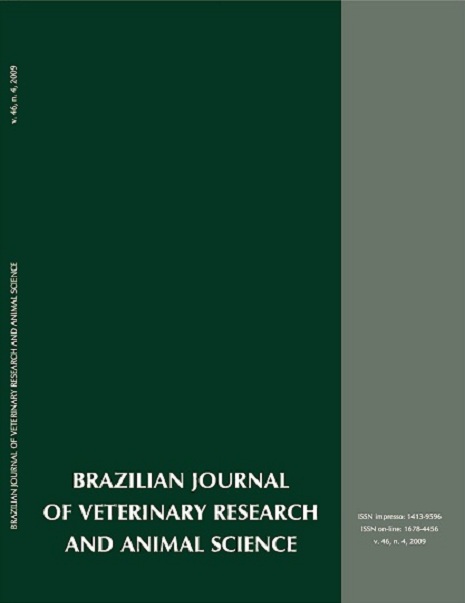Evaluation of work stress effects on Rottweilers male dog´s fertility
DOI:
https://doi.org/10.11606/issn.1678-4456.bjvras.2009.26776Keywords:
Semen, Stress, DogsAbstract
The present work aimed to evaluate the effect of work stress male dogs fertility. Eighteen fertile male Rottweiler dogs, mean aged 4 years old, were randomly allocate into two groups: resting (control) and working (treatment). Treatment consisted of 5 working stages: 1 - adaptation, 2- basic obedience training, 3 - physical conditioning and military training, 4 - camping and 5 - resting. During the experimental period, semen was collected and evaluated twice a week. At the end of each stage, blood collections were performed in order to evaluate plasmatic levels of cortisol. Data were analyzed using the statistical software SAS (a=5%). A significant negative effect of stress was observed on sperm motility (resting=72.63 vs. working=57.62, p<0.001), progressive motility (resting=3.06 vs. working=2.52, p<0.0001), major defects (resting=16.01 vs. working=26.80, p<0.0001) and total defects (resting=29.61 vs. working=40.34, p<0.0001). Furthermore, a significant interaction (P<0.0001) was observed between treatment and working stage periods for the plasmatic levels of cortisol, suggesting that the level of stress may vary according to the type of work. Results indicated that work stress may negatively influence fertility in male dogs.Downloads
Download data is not yet available.
Downloads
Published
2009-08-01
Issue
Section
UNDEFINIED
License
The journal content is authorized under the Creative Commons BY-NC-SA license (summary of the license: https://
How to Cite
1.
Sobrinho C de AB, Hatamoto-Zervoudakis LK, Barnabe VH, Nichi M, Oliveira CA de. Evaluation of work stress effects on Rottweilers male dog´s fertility. Braz. J. Vet. Res. Anim. Sci. [Internet]. 2009 Aug. 1 [cited 2024 Apr. 25];46(4):280-7. Available from: https://www.revistas.usp.br/bjvras/article/view/26776





